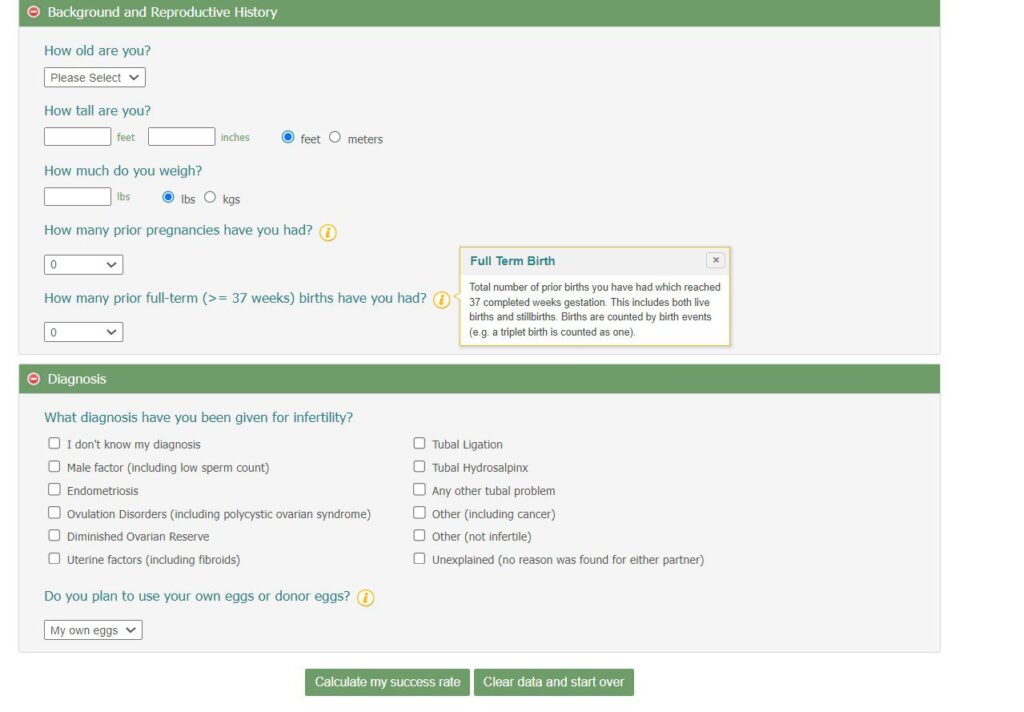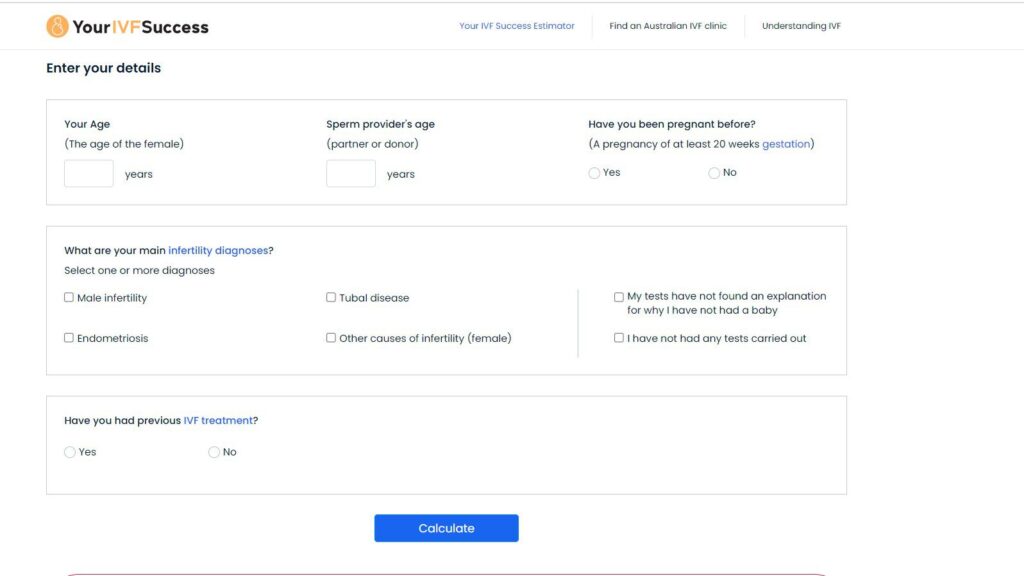IVF Success Rate Calculators Tools|IVF Success Rate Calculator

Worldwide, out of eight couples, one couple is struggling to conceive naturally and thus needs medical assistance to get pregnant. If you are going through infertility treatments you are aware of the unpredictability that comes with ART (Assistance Reproduction Technologies). In this article, we’ll delve into what IVF success rate calculators are, how they work, and their significance in the journey towards parenthood.
The success rate of the IVF cycle is not 100% and this it makes one of the hardest parts of infertility. Furthermore, the high cost of IVF cycles does not make it easy either for the intended parents. The success rate of their IVF cycle is one burning topic for hopeful parents. Most intended parents use “Online IVF Success Rate Calculators Tools” to know the success rate of their fertility treatment.
What Are IVF Success Rate Calculators?
IVF success rate calculators are online tools designed to estimate the likelihood of a successful IVF treatment. They utilize a combination of various factors, including age, medical history, and the type of IVF procedure to provide an estimate of the probability of achieving a positive outcome. These calculators are a valuable resource for individuals and couples planning or undergoing IVF, as they offer a glimpse into what they can expect during their fertility journey.
How IVF Success Rate Calculators Work
The functionality of IVF success rate calculators is rooted in complex algorithms that analyze a range of data points. Here’s a simplified breakdown of how these calculators work:
- Input Data: Users provide specific details, including the woman’s age, any prior IVF attempts, and the type of IVF procedure they are considering.
- Data Analysis: The calculator uses a combination of statistical data and medical research to process the input information. It factors in success rates for different age groups and specific IVF treatments.
- Estimation: Based on the input data and the analysis, the calculator provides an estimated success rate as a percentage. This represents the likelihood of a positive outcome in an IVF cycle.
- Additional Information: Some calculators may offer additional insights, such as the chances of multiple pregnancies or the number of cycles typically needed for success.
The Significance of IVF Success Rate Calculators
IVF success rate calculators offer several key advantages for those embarking on their fertility journey:
- Informed Decision-Making: These tools empower individuals and couples to make informed decisions about their IVF treatment. By knowing their estimated success rate, they can better plan for the emotional, physical, and financial aspects of the journey.
- Managing Expectations: IVF can be emotionally challenging. Success rate calculators provide a realistic perspective on the chances of success, which can help manage expectations and reduce anxiety.
- Customized Guidance: The calculators consider individual factors, providing a more personalized estimate. This allows couples to tailor their treatment plans accordingly.
Factors Considered in IVF Success Rate Calculations
IVF success rate calculators take various factors into account when estimating the likelihood of a successful outcome. Some of the most significant factors include:
- Age: The age of the woman undergoing IVF is a crucial determinant of success. Younger women typically have higher success rates.
- Medical History: Previous IVF attempts and the underlying cause of infertility play a role in predicting success.
- Type of IVF Procedure: The specific IVF procedure being considered, such as conventional IVF or ICSI (Intracytoplasmic Sperm Injection), can impact the success rate.
- Number of Embryos Transferred: The number of embryos transferred in a cycle can influence the chances of pregnancy.

IVF success rate is dependent on many factors.
The most common factor that affects the success rate of IVF is the age of the couple, especially the female partner.
- The cause of infertility- both in women and man
- Weigh for both parents
- Fresh eggs or frozen eggs used for IVF
- Own eggs/sperms or donor eggs/sperms used
- The lifestyle of the couple
- Primary or secondary infertility
- Female factor infertility or male factor infertility
Read more:
Tips for a high success rate of IVF
The younger the women the higher the chances of success of IVF pregnancy success rate. For women, age plays a crucial role and with age, the fertility ovarian reserve, and quality of the eggs drop. For males, age is not a major factor but having good sperms (motility and morphology) is important for a successful outcome.
Additionally, different fertility clinics use different methods to determine the success rate of IVF. So, one IVF clinic might offer you a higher IVF success rate as compared to others whose parameters for calculation might be different.
Nowadays there are many online IVF success rate calculators which intended parents can use to know the possible success rate for them. Although these tools predict the estimated successful outcome (based on the algorithms used), it is advised to seek the medical consultation of an IVF expert so that he/she can evaluate your case history, current hormonal status, scans, and tests to give you more accurate IVF cycle success.
Online, many IVF success rate predictors are available which help the intended parents to see what are their chances of IVF success.
Using IVF Success Rate Calculators Wisely
It’s essential to use IVF success rate calculators as a reference, not a definitive prediction. Success rates are estimates, and every individual’s journey is unique. Here are some tips for using these tools wisely:
- Consult a Healthcare Professional: Always consult with a fertility specialist or reproductive endocrinologist for personalized guidance.
- Consider All Factors: Remember that success rates can’t account for all variables. Factors like lifestyle, overall health, and emotional well-being also play a vital role.
- Understand the Limitations: These calculators are based on historical data and trends. They may not reflect the latest advancements in IVF technology.
Here, we are going to list the top 3 IVF success rate calculators.
#1. SART Predictor
The SART (Society For Assisted Reproductive Technology) Predictor is a US-based online tool that is established based on approximately 500,000 cycles of treatment to more than 320,000 women all over the United States since 2006.
The SART Predictor tool is easy to use but with some limits. This tool does not take into account or does not ask for a male partner (age or male factor infertility) and whether the operator is planning to use a sperm donor. Additionally, it does not consider if the user is going to use donor eggs for IVF. Also, the online calculator does not ask for any previous IVF treatments. So, it is good for first-time IVF patients, although anyone can use it no consideration is given to past IVF cycles.
This tool is better equipped for heterosexual couples who are starting IVF treatment for the first time using their own eggs and sperm.

#2. YourIVFSuccess
This online IVF success rate calculator is an Australian-developed calculator. This tool incorporates the key factors that are known to be related to the success of an IVF cycle.
The evaluation is built on the data you enter, and the chance of a live birth is based on women who have had IVF treatment in Australia with the same parameters as the user.
This tool does take into account previous IVF cycles, the number of eggs recovered, and frozen embryos, although it is only suitable for women who are using their own eggs for IVF. Fortunately, it is one of the few calculators which consider the age of the male partner/sperm donor. This tool gives the user predicted results per completed egg retrieval cycle as well as the collective figures.
Check YourIVFSuccess tool here

#3. IVF Predict Tool
IVF Predict is a UK-based IVF success rate calculator and it seems to be the most inclusive tool out there.
Contrasting most of the other predictors, it asks the user about their plan to use ICSI (Intracytoplasmic Sperm Injection, a treatment usually used for male infertility). Interestingly, this tool asks about the stimulation medication used by the female partner for stimulating the ovaries to produce many eggs. IVF Predict indicates the user possibilities of a live birth per IVF attempt, but it does not give a cumulative outcome.
Final thoughts
Online IVF success rate predictor tools can be used by the user for giving them a general idea about the possible success rate with their specific criteria. However, not all of these tools have sufficient input choices to give a comprehensive outcome. That is why intended parents are always advised to seek guidance/consultation from a fertility specialist before deciding to undertake any type of fertility treatment.
Please let us know how may we further assist you. If you are looking for infertility treatments like IVF, IVF with an egg donor, or IVF with surrogacy, we are happy to give free consultation and assist you in your parenthood journey with love and care, and a genuine desire to help. Get in touch with IVF Conceptions.

FAQs About IVF Success Rate Calculators
1. What is an IVF success rate calculator?
An IVF success rate calculator is an online tool that estimates the likelihood of a successful IVF treatment based on various factors like age, medical history, and the type of IVF procedure. It provides an estimated success rate as a percentage.
2. How accurate are IVF success rate calculators?
IVF success rate calculators provide estimates based on statistical data and medical research. While they offer valuable insights, it’s essential to understand that they are not definitive predictions and can’t account for all individual variables.
3. What factors do IVF success rate calculators consider?
These calculators take into account factors such as the woman’s age, medical history, type of IVF procedure, and the number of embryos transferred. These factors play a significant role in predicting the success of an IVF cycle.
4. Can IVF success rate calculators predict the chances of multiple pregnancies?
Some calculators may provide information about the likelihood of having twins or triplets. The number of embryos transferred can influence the chances of multiple pregnancies.
5. How can IVF success rate calculators help in the IVF journey?
IVF success rate calculators empower individuals and couples to make informed decisions, manage their expectations, and tailor their treatment plans. They offer a realistic perspective on the chances of success, reducing anxiety and stress.
6. Are IVF success rate calculators a substitute for consulting a healthcare professional?
No, they are not a substitute. It’s essential to consult with a fertility specialist or reproductive endocrinologist for personalized guidance. A healthcare professional can consider all aspects of your fertility and provide expert advice.
7. Do IVF success rate calculators consider the latest advancements in IVF technology?
These calculators are typically based on historical data and trends. They may not reflect the most recent advancements in IVF technology. Consulting with a healthcare professional can help you access the latest information and treatments.
8. Are IVF success rate calculators free to use?
Many IVF success rate calculators are available online for free. However, some may require you to create an account or provide specific information. It’s essential to use reputable and trusted calculators.
9. Are there any limitations to IVF success rate calculators?
Yes, there are limitations. These calculators provide estimates and cannot guarantee the outcome of an IVF cycle. Individual factors, lifestyle, and emotional well-being also play a significant role in the success of IVF.
10. How often should I use an IVF success rate calculator?
It’s not necessary to use these calculators frequently. You may consider using one during the initial stages of planning your IVF journey to get a rough estimate. However, always consult with a healthcare professional for personalized guidance.

